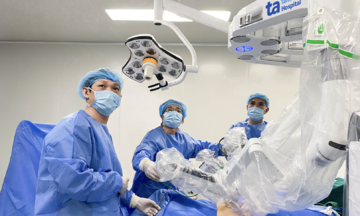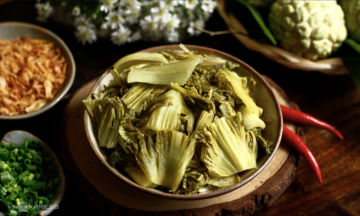Ngan first experienced acute pancreatitis 8 months ago, with symptoms including severe abdominal pain and vomiting. After a third recurrence, her family brought her to Tam Anh General Hospital in Ho Chi Minh City.
Doctor Nguyen Dong Bao Chau, from the Department of Pediatrics, said an MRI scan showed no structural abnormalities in Ngan's pancreas. However, genetic testing revealed mutations in two genes: SPINK1 and CFTR.
The SPINK1 gene plays a crucial role in creating the first line of defense against premature trypsinogen activation in the pancreas, preventing the self-destruction of pancreatic tissue. Mutations in this gene increase inflammation and pancreatic damage. The CFTR gene produces a protein that regulates the transport of salt and water across cell membranes, maintaining the normal properties of mucus and digestive fluids in the lungs, pancreas, intestines, and other organs. Mutations in the CFTR gene lead to the accumulation of thick mucus, causing blockages and inflammation in the pancreas.
Pancreatitis caused by gene mutations is often referred to as hereditary pancreatitis. According to Dr. Chau, the most common cause is a mutation in the PRSS1 gene. Ngan's mutations in two other genes are less common. This condition can be inherited from one or both parents, or it can be a single, spontaneous mutation. Other factors like environmental influences and a high-fat diet can also increase the burden on the pancreas and the risk of inflammation.
 |
Dr. Bao Chau consults with the patient. Illustrative photo: Dang Khoa |
Genetically linked pancreatitis often starts at a young age and has a high risk of recurrence. It can lead to chronic pancreatitis, reducing pancreatic function and increasing the risk of pancreatic cancer. There is no definitive cure for the disease. However, accurately identifying the cause helps doctors develop an optimal preventative treatment plan.
Dr. Chau prescribed Ngan daily pancreatic enzyme supplements, combined with a low-fat diet and smaller, more frequent meals. Ngan’s health is currently stable, but she needs to maintain a healthy lifestyle, continue taking enzyme supplements, and attend regular check-ups to monitor for complications. If she experiences severe vomiting and abdominal pain, indicating a flare-up, immediate hospitalization is necessary to prevent serious complications like sepsis and necrotizing pancreatitis.
According to Dr. Chau, there are no official statistics on the prevalence of genetically linked pancreatitis in Vietnamese children. Recently, at Tam Anh General Hospital, doctors successfully diagnosed and treated two children with this condition. The previous case, in late June, involved an 11-year-old girl diagnosed with chronic pancreatitis due to a SPINK1 gene mutation.
High-fat diets and fast food can trigger acute pancreatitis attacks. Recurrent acute pancreatitis can lead to poor nutrient absorption, affecting a child's growth and physical development.
Symptoms of acute pancreatitis in children include severe upper abdominal pain, which may start suddenly and radiate to the back. The pain often worsens after eating. Other symptoms are nausea, vomiting, fever, and a rapid heartbeat. Children experiencing these symptoms should be taken to the hospital immediately. If the condition recurs or is suspected to be genetic, advanced diagnostic tests should be performed.
Patients with hereditary pancreatitis due to gene mutations may develop chronic pancreatitis, exocrine pancreatic insufficiency, and diabetes in the future. It's crucial for these children to adhere to their doctor's treatment plan, including dietary and lifestyle recommendations.
Hoai Thuong
*The patient's name has been changed.
| Readers can submit questions about children's health here for doctors to answer. |












